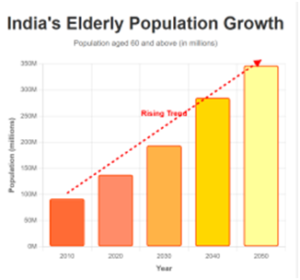Ethics Theory, TLP-UPSC Mains Answer Writing
Q. 2. “Do you think India is prepared for a greying nation as its youth dividend fades? Examine the challenges of an ageing population and suggest sustainable policy responses.” (150 words, 10 marks)
Introduction
India is home to over 140 million elderly citizens, a number expected to double by 2050. While the country enjoys a demographic dividend today, the shift toward an ageing population poses complex social, economic, and healthcare challenges.
Body
India’s Readiness for a Greying Nation
- Limited Elderly-Centric Infrastructure: India lacks adequate old-age homes, geriatric care units, and age-friendly urban spaces. Example: As per Longitudinal Ageing Study in India (LASI), only 5% of hospitals have dedicated geriatric wards.
- Inadequate Pension and Social Security Coverage: Majority of the elderly remain outside formal pension systems, especially in unorganised sectors. Example: NSSO data shows that only 25% of India’s elderly receive any form of pension.
- Healthcare System Not Age-Inclusive: Geriatric care is not integrated into primary health services, leading to untreated chronic conditions. Example: India has less than one geriatrician per lakh population (Indian Journal of Geriatric Care, 2022).
- Rising Mental Health Concerns: Loneliness, depression, and neglect are rising among the elderly. Example: A 2021 HelpAge India report found that over 60% of elders feel they are a burden to their families.
However, India has the time and tools to adapt to this transition.
Emerging Support Systems and Opportunities
- Growing Focus on Geriatric Policy: Schemes like National Programme for Health Care of the Elderly (NPHCE) are being scaled up.
- Role of Technology and Telemedicine: Platforms like e-Sanjeevani are bridging the healthcare gap for elders in remote areas.
- Expanding Role of Civil Society: NGOs and private players are launching elderly helplines, companionship programs, and wellness centres.
- Elderly as Human Capital: Many seniors are skilled, experienced, and willing to contribute in part-time or advisory roles post-retirement.

Challenges of an Ageing Population
- Economic Dependency: Increasing number of dependents burdens the working population and social support systems. Example: Old Age Dependency Ratio is projected to double from 14.2% (2021) to 28.2% by 2050 (UNFPA Report).
- Rising Healthcare Costs: Chronic illnesses, disabilities, and medication costs strain both families and public health expenditure. Example: WHO estimates India’s elderly healthcare burden to rise by over 400% in two decades.
- Breakdown of Traditional Family Support: Urban migration and nuclear families leave many elders without caregivers. Example: According to Census 2011, nearly 15 million elderly live alone or with only a spouse.
- Social Isolation and Elder Abuse: Many seniors face neglect or abuse, especially women. Example: HelpAge India’s 2023 survey found 1 in 3 elderly had experienced some form of abuse.
Sustainable Policy Responses
- Universal Pension Reforms: Introduce a robust universal old-age pension scheme indexed to inflation, building on Indira Gandhi National Old Age Pension Scheme and PM Vaya Vandana Yojana.
- Geriatric Healthcare Integration: Include elderly care in Ayushman Bharat, train more geriatric professionals, and strengthen the National Programme for Health Care of the Elderly.
- Promote Age-Friendly Urban Design: Mandate accessible public spaces, housing, and transport under AMRUT and Smart Cities, guided by WHO’s Age-Friendly Cities framework.
- Community-Based and Assistive Support: Expand senior citizen homes, distribute aids under Rashtriya Vayoshri Yojana, and promote dignity through initiatives like Vayoshreshtha Samman.
Conclusion
India stands at a demographic crossroads. As the youth dividend tapers, the ageing challenge must be met with foresight, compassion, and innovation. According to the Economic Survey 2022, now is the time to invest in “Silver economy” strategies — not just to support the elderly but to ensure inclusive and resilient national development.











